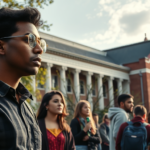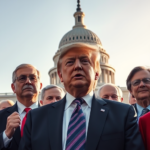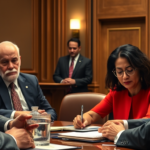Indiana Professor’s Suspension Sparks Debate Over Academic Freedom and Intellectual Diversity
An Indiana University professor has been suspended from teaching a social justice course after utilizing a graphic that labeled the “Make America Great Again” slogan as a form of covert white supremacy. This disciplinary action was cited under a relatively new state law designed to promote “intellectual diversity,” igniting a contentious debate over academic freedom and the role of political influence in educational settings.
The Incident and Legal Context
The incident arose when a student expressed discomfort with the classroom material, specifically the graphic in question, to Indiana Senator Jim Banks. Senator Banks, a staunch supporter of the MAGA movement, took swift action by reporting the incident to the university administration. Subsequently, the professor, identified as Jessica Adams, found herself removed from her teaching duties while an investigation is ongoing to determine whether further disciplinary action is warranted.
The Indiana law at the center of this controversy mandates that educational faculty present a range of scholarly perspectives and adhere to a guideline that fosters intellectual diversity. Critics argue that the law serves more to suppress academic discourse rather than enrich it. They point to its usage as a tool for silencing views that challenge politically sensitive topics, such as racism and white supremacy.
Heather Johnson, a policy analyst with the American Association of University Professors (AAUP), offered a critical perspective: “This law, ideally, should enhance educational experiences by incorporating diverse viewpoints. Unfortunately, it’s being manipulated to curtail honest academic discussions, which contradicts the principles it purports to uphold.”
Classroom Discussion and Academic Freedom
The classroom session where the graphic was used aimed to discuss racism as a component of social work education. According to Professor Adams, the controversial material was not intended as a definitive statement, but as a discussion starter to explore students’ perspectives on the visible and invisible threads of white supremacy in society.
Adams maintains her innocence and asserts that her academic freedom is being infringed upon. Despite the controversy and personal uncertainty, she continues to teach three other courses while awaiting the university’s final decision. “It’s crucial to have these challenging conversations in academic settings to prepare students for the realities they’ll encounter in the field,” she explains. “This investigation feels more like censorship than a quest for intellectual diversity.”
Community and University Response
The suspension has sent ripples through the local community and broader academic circles, prompting discourse around the balance between free expression and institutional policies. For Indiana University, this incident is emblematic of a national trend, where political pressures increasingly influence academic governance and curriculum content.
The university issued a statement confirming its adherence to academic freedom principles and a commitment to due process. However, the institution refrained from commenting on the details of the ongoing investigation or specific personnel actions.
Meanwhile, the Indiana University Bloomington chapter of the AAUP has rallied behind Adams, denouncing the application of the law in this circumstance. “The suspension of Professor Adams under the guise of promoting intellectual diversity is a grave misinterpretation of the law’s intent,” stated the chapter in a press release. “We stand firmly against this misuse which threatens the core of academic integrity and faculty autonomy.”
A Broader National Debate
This local development echoes broader national tensions regarding free speech on college campuses and the role of political actors in shaping academic discourse. The controversy has sparked comparisons with past incidents across the United States where legislation and administration policies have been called into question for potentially undermining educational freedom.
The ongoing narrative also aligns with persistent debates over conservative voices being marginalized on campuses, a claim that has featured prominently in political discourse over recent years. Yet, in this case, it is a liberal perspective that seems to be under scrutiny, highlighting the complexities inherent in safeguarding truly diverse intellectual environments on college campuses.
James Bennett, a political scientist at Indiana University specializing in education policy, notes the duality of the scenario: “There’s an irony here where efforts to include multiple voices may inadvertently suppress some. It is a perplexing issue for policymakers and educators alike to navigate.”
Future Implications and Resources
As the investigation proceeds, the outcome could set meaningful precedents for Indiana and other states grappling with similar issues. The implications for academic policies, intellectual diversity laws, and the broader landscape of educational freedom in the United States remain significant.
For community members, understanding such legislative impacts is vital. Local residents and concerned parties are encouraged to stay informed and engage in dialogues concerning the implications. The university plans to offer informational sessions and additional resources to facilitate understanding of these academic principles and legal frameworks.
In what continues to be a divisive issue, this situation highlights the delicate balance that must be struck between fostering diverse educational environments and preserving the essential freedoms integral to higher education pursuits. Woke News remains committed to examining these developments and their local impact as they unfold, reinforcing the principle that informed discussion is at the heart of community progress and enlightenment.
For further information or to express concerns, local residents can contact Indiana University’s office for academic affairs or participate in scheduled community forums.







